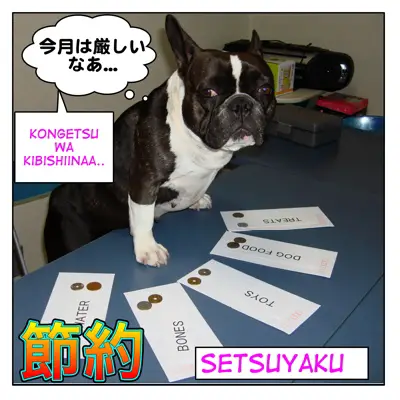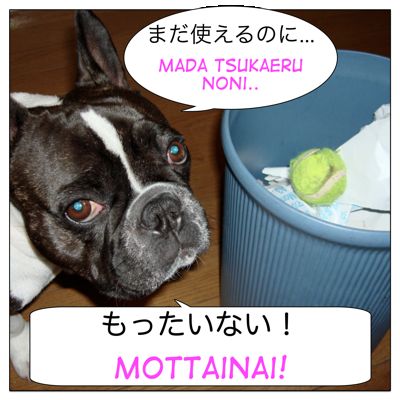:maggie-small: 「今月は厳しいなあ…」
= Kongetsu wa kibishii naa..
= “This month is kind of tight..”
:maggie-small: 「まだ使えるのに…」
= Mada tsukaeru noni..
= “It is still usable…”
(I can still play with the ball!)
「もったいない!」
=Mottainai
= “It is a pitty to throw it away and waste it.”
Hi, everyone! I am working on my budget for the month. It looks tight!
:maggie-small: From the picture above :
•「今月は厳しいなあ..」
= Kongetsu wa kibishii naa..
= “It’s tight this month.”
•厳しい ( = kibishii) severe, hard, difficult, strict
Ex. 厳しい不況
= kibishii fukyou
= a severe recession
Ex. マギー先生は厳しい。
= Maggie sensei wa kibishii.
= Maggie is a strict teacher.
So today’s first key word is 節約 ( = setsuyaku) !
:kkk: Let’s check 漢字 ( = kanji) first!
:u:
節 ( = setsu/fushi)
•節水 ( = sessui) saving (economizing )on water
![]() verb +する ( = suru) 節水する ( = sessuri suru)
verb +する ( = suru) 節水する ( = sessuri suru)
•節電 ( = setsuden) saving (economizing) on electricity
![]() verb +する ( = suru) 節電する ( = setsuden suru)
verb +する ( = suru) 節電する ( = setsuden suru)
•節減 ( = setsugen) reducing
:rrrr:verb +する ( = suru) 節減する ( = setsugen suru)
Ex. 経費を節減する
= Keihi wo setsugen suru.
= to reduce the cost
•節制 ( = sessei)abstention
![]() verb +する ( = suru) 節制する ( = sessei suru)
verb +する ( = suru) 節制する ( = sessei suru)
Ex. しばらくお酒を節制する
= Shibaraku osake wo sessei suru.
= to abstain from drinking for a while. to reduce the cost
約 ( = yaku)
•約束 ( = yakusoku) promise
(Note: We have already seen this word in our させる、させられる lesson)
•約 ( = yaku) about, approximately
約100名程の人がパーティー に招待された。
= Yaku hyakumei hodo no hito ga paatei ni shoutai sareat.
= About 100 people were invited to the party.
節約する ( = setsuyaku suru)
It means to economize, to cut corners.
Ex.来年、結婚するのでしばらく節約しないといけない。
= Rainen kekkon suru node shibaraku setsuyaku shinai to ikenai.
= I have to be save money ’cause I am going to get married next year.
Ex. 時間の節約の為、高速道路を利用して下さい。
= Jikan no setsuyaku no tame kousoku douro wo riyou shite kudasai.
= Please use the highway in order to save time.
Ex. うちの会社は経費を節約の為、残業を今月から禁止した。
= Uchi no kaisha wa keihi wo setsuyaku no tame zangyou wo kongetsu kara kinshi shita.
= Our company banned overtime work to cut down the cost.
:: The synonyms of 節約 ( = setsuyaku) is:
![]() 倹約 ( = kenyaku) →verb +する ( = suru) 倹約する ( = kenyaku suru) to save
倹約 ( = kenyaku) →verb +する ( = suru) 倹約する ( = kenyaku suru) to save
Ex.ちょっと今日は食費を倹約してコンビニ弁当を買って帰ります。
= Chotto kyou wa shokuhi wo kenyaku shite konbini bentou wo katte kaerimasu.
=
I will get a bento(boxed lunch, or a type of Japanese TV dinner) at convenience store to cut the food cost.
•倹約家 ( = kenyakuka) a person economist, saver, a penny-pincher
= 節約家 ( = setsuyaku ka)
•倹約モード ( = kenyaku moudo) in the mode of economyzing
= 節約モード ( = setsuyaku moudo)
•時短 ( = jitan) time reduction ←時間短縮 ( = jikan tanshuku)
•省エネ ( = shou ene) saving energy
•エコ( = eko) ecology
•削る ( = kezuru) to trim, to cut down
•生活費を削る ( = seikatsuhi wo kezuru) to cut down the living cost
•切り詰める ( = kiritsumeru) to cut down
Many of you have already known the meaning of ケチ( = kechi), right?
•ケチ ( = kechi) cheap, stingy
•ケチ ( = kechi) cheap, stingy
:u:
•「ねえ、新しいおもちゃ買って!」
= Nee, atarashii omocha katte!
= “Buy me a new toy!”
「だめ、今、お金ないから!」
= Dame, ima okane nai kara!
= “No! I don’t have any money now!”
「ケチ!」 ( = kechi) “You are so cheap!”
•彼はケチだからクリスマスに何も買ってくれない。
= Kare wa kechi dakara kurisumasu ni nanimo katte kurenai!
= He is cheap so he won’t buy me anything for Christmas!
•「ドケチ!」
= Dokechi
= Super cheap!
(Note : casual, “ど” ( = do) is very colloquial way to emphyasize a word, “super”)
There is a verb for ケチ ( = kechi) :
•ケチる ( = kechiru) verb to be skimp (conversational)
•「ケチらないで、これ頂戴よ!」
= Kechiranai de kore choudai yo!
= “Don’t be cheap and just give it to me! “
•ケチケチする ( = kechi kechi suru) verb to be skimp
•この料理はワインをケチケチしないで一杯使って下さい。
= Kono ryouri wa wain wo kechikechi shinai de ippai tsukatte kudasai.
= Don’t skimp on the wine and use it a lot for the dish.
![]() •ケチケチした ( = kechi kechi shita) adjective stingy, cheap
•ケチケチした ( = kechi kechi shita) adjective stingy, cheap
•財布の紐が固い ( = saifu no himo ga katai) keep a tight hold on one’s purse strings
•財布の紐を固く絞める。
( = Saifu no himo wo kataku shimeru)
tighten one’s belt
Ex. 今年はボーナスが少ないので皆、財布の紐が固い。
= Kotoshi wa bounasu ga sukunai node mina saifu no himo ga katai.
= The bonus this year is so little that everybody is keeping a tight hold on one’s purse strings.
!to right! 財布の紐をにぎる
= saifu no himo wo nigiru
= to hold the purse string
Ex. あなたの家では誰が財布の紐を握っていますか?
= Anata no ie dewa dare ga saifu no himo wo nigitte imasu ka?
= Who holds the purse string?
:k: Other saving expressions :
•お金を貯める ( = okane wo tameru) to save money
•コツコツ貯める ( = kotsukotsu tameru) to save money little by little
•貯金する ( = chokin suru) to save money in a bank
•貯金が底をつく
( = chokin ga soko wo tsuku)
Saving drives up
Ex.そろそろ貯金が底をついてきた。
= sorosoro chokin ga soko wo tuite kita.
= My saving is drying up.
•へそくり ( = hesokuri) stash money
Ex. 多くの主婦がこっそりとへそくりをしている。
= Ooku no shufu ga kossori to hesokuri wo shiteiru.
= Many housewives stash money in secret.
![]() Expressions of wasting money :
Expressions of wasting money :
•無駄遣い ( = muda zukai) lavish spending
•無駄遣いをする
= muda zukai wo suru
=to waste, to waste or spend money for something in vain.
•無駄金を使う
= muda gane wo tsukau
= to waste money
•無駄を押さえる
= Muda wo osaeru
= to try to reduce the waste
•無駄を削る
= muda wo kezuru
= to trim the waste
•無駄をなくす
= muda wo nakusu
= to cut waste
•どぶに金を捨てる
= dobu ni kane wo suteru
= pour money down the drai
•浪費 ( = rouhi) overspend money, to be extravagant with one’s money. to splurge
•浪費家 ( = rouhi ka) a big spender
•浪費癖 ( = rouhi heki) spending habit
:s: Today’s second key word is もったいない ( = 勿体ない) ( = Mottainai)
It means waste, wasteful but it has a sense, “It is still usable and it’s a shame to waste it or throw away.
See the second picture above. I found my favorite ball in a trash box. Yukari threw it away. :mad:
(このボール)まだ使えるのに(捨てるなんてもったいない)!
= (Kono bouru) Mada tsukaeru noni (suteru mante mottainai yo!)
= “(This ball is still good enough to play with). What a waste! “
If you see someone is throwing away the leftover, you can say,
![]() 「まだこれ食べられるよ。もったいないから私に頂戴!」
「まだこれ食べられるよ。もったいないから私に頂戴!」
= Mada kore taberareru yo. Mottai nai kara watashi ni choudai.
= “This is still eatable! Don’t waste it and give it to me!”
![]() 「ああもったいない!」
「ああもったいない!」
= Aa Mottai nai!
= What a waste/ “What a pitty that you throw that away! (It is still good.)”
Note : Ms. Wangari Maathai, the Nobel Peace Prize winner, was very impressed with this Japanese concept and has used this word as a motto of The Green Belt Movement
:kkk: もったいない ( = motttainai) also means “too good for someone”
•もったいない話です。
= Mottainai hanashi desu.
= This offer is too good for me.
•彼は私にはもったいない 人です。
= Kare wa watashi niwa mottainai hito desu.
= He is out of my league. /He is too good for me./ I am not good enough for him.
 マギー先生より = Maggie-sensei yori = From Maggie-sensei
マギー先生より = Maggie-sensei yori = From Maggie-sensei
これからしばらく節約しなくっちゃ。
= Kore kara shibaraku setsuyaku shinakuccha.
= I have to live economically for a while.
このブログも一度来るだけでは私の労力がもったいないから何度も来てね。
= Kono burogu mo ichido kuru dake dewa watashi no rouryoku ga mottai nai kara nandomo kitene.
= It would be waste of my work if you just visit here once so please come back here again an again!
***
Will you be my Patron?
I appreciate your support! サポートありがとう!



12 Comments
Wonderful website and truly helpful lessons! After I finished basic Japanese grammar I was stuck for quite a while, not knowing how to continue developing my knowledge. It’s really difficult to transition from purely academic level to more colloquial expressions. Your amazing blog is really helping me with that. Thank you so much for your hard work and dedication.
@Niniko
Hello Niniko!
I’m happy to hear you found my site help.
Hope you come visit here often! これからもよろしくね!
Hi, your blog is one of the most awesome things and the most useful when it comes to studying Japanese :D
Can you please explain to me what is the difference between こっそり and ひそかに?
@Sandra
Hello Sandra,
Glad to hear you think this site is useful. :)
こっそり & ひそかに
They both mean “secretly” but こっそり is used mainly for actions ひそかに can be used actions and also feelings for others.
Action:
こっそり彼の後をつける。
ひそかに彼の後をつける。
= To follow him in secret
Feelings
ひそかに彼のことを思う。
= To love him secretly.
(△こっそり彼のことを思う)
ひそかに信じる
= to believe secretly
(△こっそり信じる)
Hi!
Here am I again, always nagging with questions, haha.
1) Are 倹約 and 節約 total synonyms? No diffence in nuance or usage?
2) 倹約家 and 節約家 mean saver but… in a good way or negative way?
@Cygnus
The difference is very subtle but here you go!
節約=無駄をはぶいて、切り詰めること。=To trim down the cost cutting waste
倹約=金や物を無駄遣いしないように努めること。= Try not to waste money or things.
Thank you! And if you call someone 倹約家 or 節約家, would that be praise? Or can it be negative?
@Cygnus
They both are not negative. But you may have to be careful when and how you use it.
Because it may sound that person is cheap. You know what I mean..
YES, I wanna come here again and again so 早く新しいレッスンを作てね!楽しみにしっているよ!^O^
先生のブログが大好き<333
感謝!
@Aki
Thank you!!! You are always so sweet!!
(楽しみにしっている→してるよ) 今、新しいレッスンつくってるよ。待っててね!
また素晴しいレッソンを教えてくれて有り難うございます。
もちろんこんなステキなブログを何度でも来ます。
@aaninoue8
毎日いろいろなレッスンをチェックしてくれてありがとう!